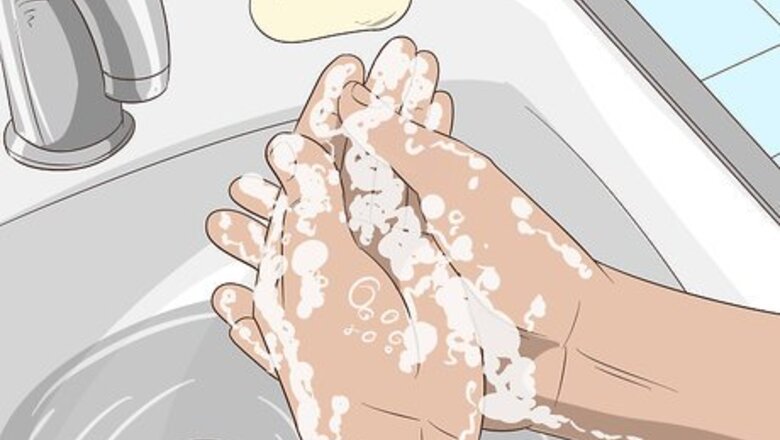
views
Tending to Your Wound
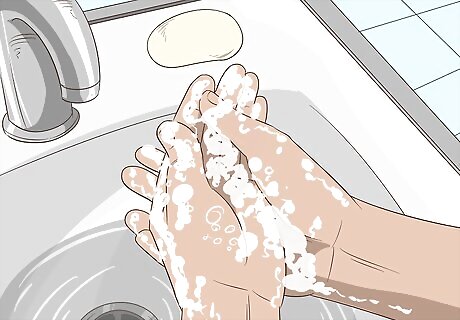
Wash your hands. Before touching or treating the wounds on your face, make sure you wash your hands. Use warm water and antibacterial soap. Dry them with a clean cloth. Don’t touch anything after washing your hands because that could contaminate them. Touching an open wound on your face with dirty hands can transfer dirt and bacteria to the wound, which can slow the healing process.

Clean the wound. Wash the wound on your face with warm water and soap. Avoid using hot water because this may cause the wound to start bleeding. Remove any debris or dirt from the wound under a running faucet, and avoid hard scrubbing. Washing the wound can remove bacteria that could lead to infection.
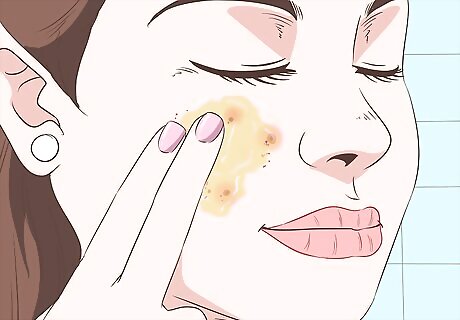
Apply ointment. Keeping the wound from drying out helps speed up the healing process. Use petroleum jelly or antiseptic ointment. Place the ointment on the wound with clean fingers or with a cotton swab. Keeping the wound from drying out prevents scabs from forming, which can delay healing and lead to scarring.

Cover the wound with a bandage. Open wounds are very vulnerable. They are exposed to dirt, debris, and contaminants that could lead to infection. To help protect the open wounds on your face and make sure they heal faster, place an adhesive bandage over them. Change your bandage daily. Try to find a bandage that is breathable, like gauze. This helps air still reach the wound, which will make it heal faster than if it gets no air. A bandage can help keep the wound moist so it can heal more quickly.
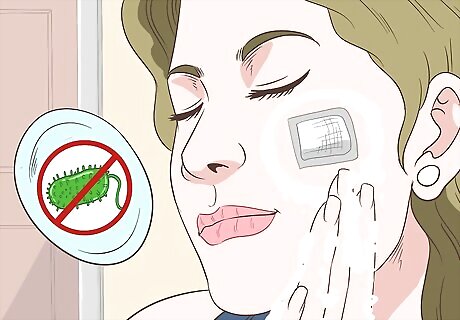
Keep the skin around the wound clean and dry. To protect the wound and prevent infection, keep the skin around the open wound clean. Wash that part of your face with either a face wash or antibacterial soap. You should also dry that area well after you are finished and keep the skin dry.
Seeking Medical Attention
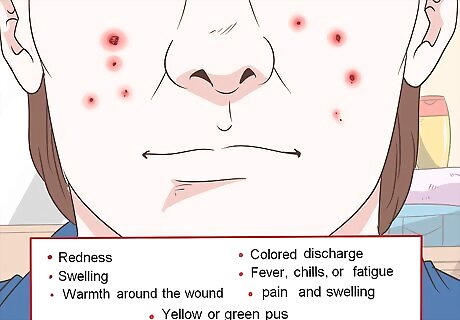
Watch for signs of infection. Open wounds are vulnerable to infection. Symptoms of infection include redness, swelling, warmth around the wound, and/or pus or colored discharge coming from the wound. You may also develop a fever, chills, or fatigue if the infection worsens or spreads. Seek medical attention if this happens. An uncomplicated infection on your face can sometimes turn into facial cellulitis. This is an infection of deeper layers of the skin and underlying tissue, and it can cause serious complications if left untreated. Watch for redness, pain and swelling, and yellow or green pus.

See a doctor if you have a condition. Some people heal more slowly or are at risk of complications from infections, including those who are obese, diabetic, have poor circulation due to arteriosclerosis, smoke, use alcohol heavily, or are under stress. See a doctor about your facial wound if you fall into one of these categories. They can advise you on the best plan of treatment.
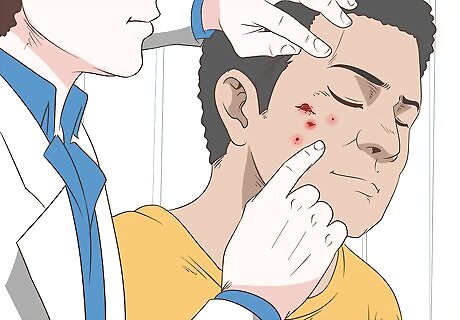
Go to the doctor for deep facial wounds. Only minor wounds should be treated at home. See a doctor if you have deep wounds with rough or uneven edges, if you can’t bring the edges of the wound together, or if you can’t properly clean the wound. You may need stitches to pull the skin back together, or you may be at risk for infection. If the wound won’t stop bleeding, seek medical attention immediately as it may be a serious laceration. See a doctor if the area around the wound becomes very swollen, red, and tender to the touch. You may need an oral antibiotic to fight an infection.
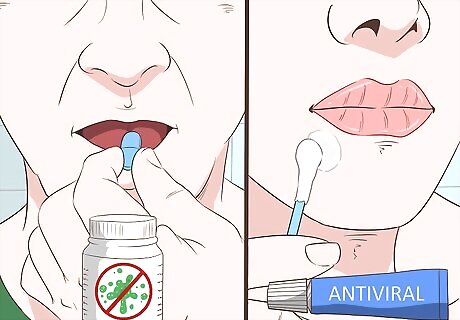
Take antiviral drugs for cold sores. If the open wound on your face is caused by a cold sore, your doctor can prescribe antivirals to help heal it. These drugs may be in a pill or cream form. Pills generally heal cold sores faster than creams. Some of these medications, like Abreva, may be available over-the-counter.
Promoting a Healing Environment
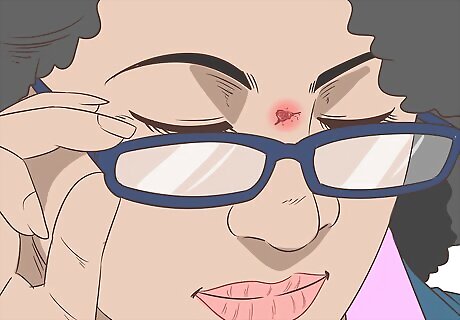
Remove any pressure from the affected area. Some facial wounds are caused by the pressure of something rubbing on the delicate skin of the face. This may be due to an oxygen tube or even eyeglasses. If this is the cause of your facial wound, remove the source of the wound for periods of time, especially while it is healing. If you are not sure how to change the way you wear your eyeglasses or oxygen tubes, talk to your doctor.

Increase your protein. Your diet can affect your body’s natural healing properties. To help make sure your face wounds are healing as quickly as possible, increase your protein intake. Try adding meats, dairy, whole grains, legumes, and vegetables to your meals. Lean meats are a great source of protein. Try chicken breast, fish, pork, eggs, or lean beef. Dairy products also contain a lot of protein. Greek yogurt, cottage cheese, and low-fat cheese can make good snacks to increase your protein. Whole grains, like quinoa and bulgur, contain protein, as do black beans, lentils, soy beans, red beans, and kidney beans. Try green vegetables for protein, such as spinach or broccoli. Avoid junk food that increases inflammation and hinders healing.

Use supplements. One way to help sores heal quickly is to improve your immune system with dietary supplements. This includes vitamins like vitamins C and A. Zinc can also help to promote healing and to stop infections of the skin.
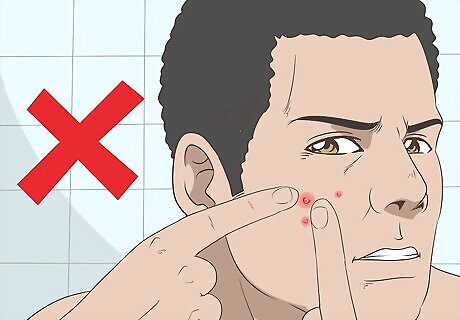
Avoid picking the scabs. When your open wounds start to scab over, don’t pick at the scabs. Picking at them can slow the healing process and lead to scarring. Leave the scab alone. Continue adding petroleum jelly to the wound to help keep the scab from drying out.
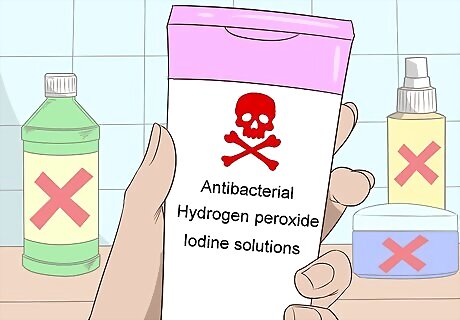
Avoid harsh solutions on facial wounds. When treating wounds on your face, don’t try to clean them with harsh solutions. This can damage the injured tissue or irritate the wound, which will slow the healing process. Don’t use antibacterial solutions, hydrogen peroxide, or iodine solutions.

Use an ice pack. If your open wound has swelling around it, try using an ice pack. Take a cold compress or ice wrapped in a towel and place it on the wound for around 10 to 20 minutes. You can do this multiple times a day. Never place ice directly on the wound. This could cause your face to burn.
Healing Wounds Naturally

Make a chamomile compress. Chamomile also aids in healing because it has antibiotic and antiseptic properties. Soak a cloth in lukewarm chamomile tea and press it against the wound. You may also put cool tea bags directly onto the wound.

Apply tea tree oil. Tea tree oil is an essential oil that has antimicrobial and antibacterial properties. To use it for your wound, place two drops of oil in a cup of warm water. Place a cotton ball in the solution and then dab it on the wound. Apply no more than twice a day. Because it is so strong, the oil must be diluted with water. Test the tea tree oil on a small patch of skin before placing it on your wound. Some people are sensitive to tea tree oil.
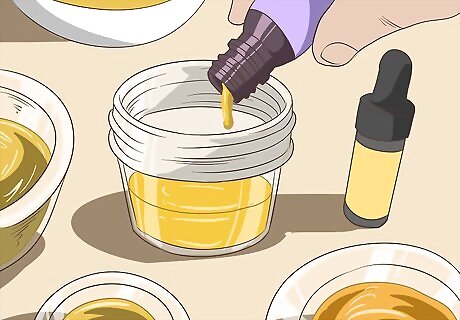
Use essential oils. Different essential oils may help heal your wound. Mix a few drops of one of the essential oils with a carrier oil, like olive or almond oil. Lavender, eucalyptus, clove, rosemary, and chamomile essential oils have antibacterial, antimicrobial, and antiseptic properties and can help disinfect and heal the wound. Note that while these oils may have antimicrobial or healing properties, further research is needed to verify their efficacy and alleviate potential safety concerns.


















Comments
0 comment